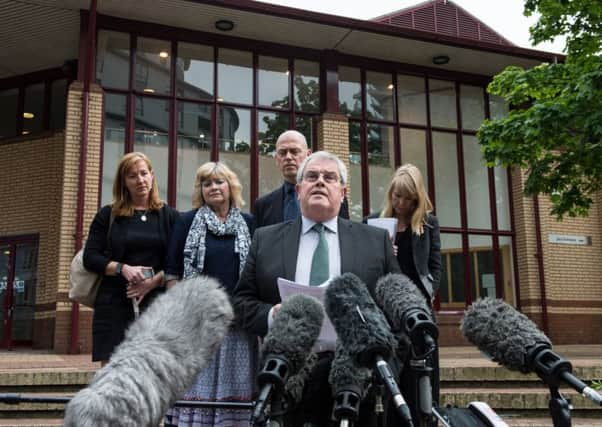Leaders: Deepcut is a disgrace | Positive signs from BP


It suggests a society where the rights and needs of individuals who have suffered great loss are thwarted by arms of the establishment who deliberately obstruct investigation in order to cover up massive shortcomings. It is a sad indictment.
Pte Cheryl James was one of the so called Deepcut Four, four young recruits who over a period of seven years were found dead in remarkably similar circumstances on the training base for the Royal Logistics Corps.
Advertisement
Hide AdAdvertisement
Hide AdFollowing the death of Pte James, found with a bullet wound to her head in 1995, the second recruit to die from gunshot wounds that year, there was an inquest. It lasted an hour and returned an open verdict. That cannot be described as anything like a reasonable investigation in to her death. The police have admitted their lack of investigation at that time was a mistake.
Yesterday, 21 years after her death, Brian Barker QC, after an inquest that lasted three months and heard from 109 witnesses, overturned the open verdict and said that his view was that Pte James had died of a self-inflicted wound.
But he painted a damning picture of army life at Deepcut and said the army had failed in its duty of care to young recruits. The coroner said there was a “sexualised” atmosphere at the barracks in Surrey, adding there were far too few officers at the barracks to train and look after the young squaddies, who were left bored and indisciplined.
Military rules were flouted as female recruits were allowed to carry out guard duty on their own, and that guard duties were routinely handed out as punishment. The barracks had a reputation as a brutal place and difficult NCOs were sent there to get them away from other establishments. There was a serious lack of welfare provision for young recruits. It all paints a picture of a barracks out of control.
So let us consider the timeline in this tragedy.
Pte Sean Benton, from Hastings, was the first recruit to be found dead, in June 1995. Then there was Pte James in November 1995. In 2001 Pte Geoff Gray, aged 17 from Seaham, was found with two gunshot wounds to his head in 2001. And the year after Pte James Collinson, from Perth, died.
It would appear that the greatest tragedy here is the length of time between the deaths of these poor young people. It seems that if the deaths of Privates Benton and James had been properly investigated, the terrible regime at Deepcut might have been uncovered and tackled. The army believed they were suicides at the time, but did not sufficiently investigate what may have led them to take their lives.
If they had, who knows what pain and heartache may have been prevented.
Disgrace is an overused term, but here it is entirely fitting.
BP’s vote of confidence is welcome
Advertisement
Hide AdAdvertisement
Hide AdBP has a big part in the history of the North Sea. It was the second company to hit a major find when it discovered oil in the Forties field in 1970. It took another five years to get the first oil ashore.
So it is appropriate that in this time of trouble for the North Sea oil and gas industry, it is stalwart BP that comes with a ray of light.
And there can be no doubt that the oil industry is in need of good news. The recent crash in the global price of the commodity has cost Scotland 65,000 jobs with more redundancies in the pipeline due to more projects being put on hold. That terrible price has not been the only one.
Last week the UK government revealed it had incurred a revenue loss from North Sea oil and gas production for the first time since records began nearly 50 years ago. A fall in company profits, increased costs of decommisioning and high levels of investment meant the UK government made no money in tax from the North Sea, and in fact ended up £24 milion out of pocket because of payments to oil companies.
The most heartening aspect of the BP statement is not the 534 jobs the two large-scale projects to the west of Shetland will create. The company cut 600 jobs earlier this year. It is the statement of intent to produce oil from the North Sea for the next 40 years.
OK, so there are one billion barrels of oil to be extracted so they are definitely getting something out of it, but it is the signal to Scotland and to the rest of the world that the North Sea is a long way from the end of its life. It is a much-needed vote of confidence and could not be more timely. Lets hope others follow suit.